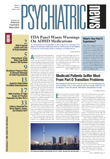The use of audiotaped treatment sessions for supervision of psychiatric trainees was described in the October 21, 2005, issue by Dr. Tomar Levin. He pointed out how much is lost or distorted in the description of treatment when supervisors meet with trainees at some time after the session in question was held. While the time invested in listening to audiotapes more than doubles the time for the supervisor, at least a close replica of what actually transpired in the treatment session becomes available for scrutiny and discussion.
However, there is yet a better way to conduct supervision, one that I have used to good advantage for over 30 years. I meet with the patient and the trainee together—with the patient's permission. As the session unfolds, the trainee employs his/her skills for me to observe directly, including the subtleties of nonverbal communication, relating, timing, and reciprocity. In addition, I am able to demonstrate interviewing and therapeutic techniques, as the educational process dictates. The trainee is prepared for this spontaneous interplay, benefiting from the positive feedback that is contingent upon his/her emerging competencies as well as from my professional modeling. The learning experience is reinforced by approximately 15 minutes of debriefing after the session ends. This pedagogical method is used for diagnostic evaluations and individual, family, and group treatment.
This is the traditional “bedside” or “clinic” rounding that has been a keystone of teaching in all medical specialties for 100 years—except for psychiatry. The inexplicable failure of psychiatry to use the most effective teaching technique has been yet another nail in the coffin of psychiatry's credibility with our colleagues in medicine, surgery, and primary care. A false curtain drawn around confidentiality and solipsistic self-disclosure in the psychoanalytic tradition has led to psychiatry's indirect and watered down modes of teaching.
In three decades of teaching buttressed by principles of learning, there have been fewer than a handful of patients who have been uncomfortable with the spontaneity of this direct teaching; most feel that they are benefiting from two physicians' experiences and expertise, give permission, and cooperate fully. Residents and other trainees respond with enthusiasm to this competency-based approach to teaching.
